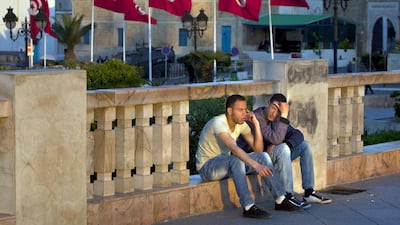Tunisia's economy is displaying signs of economic recovery following difficult years since the Arab Spring, but remains dependent on consumption and imports, with weak investment and high levels of unemployment, prompting calls from the International Monetary Fund to cut its fiscal deficit and stabilise public debt.
“There are some encouraging signs that economic activity is picking up,” said Björn Rother, IMF economist and head of staff for Tunisia, in a note on Friday following a visit to the North African country at the end of August. The economy grew at 2.6 per cent year-on-year in the first half of this year with strong performance in agriculture, services and tourism. The number of visitors to Tunisia in 2018 to date is the highest since 2010, the IMF noted.
However, “long-standing economic imbalances continue to pose significant risks to the economy”, Mr Rother said. While inflation declined marginally in July, at 7.5 percent, it remains considerably higher than in previous years.
Tunisia, whose 2011 "Jasmine Revolution" toppled dictator Zin El Abidine Ben Ali and sparked protests around the Middle East that came to be known as the Arab Spring, has struggled to revive its economy seven years on.
Political divisions, sporadic terror attacks and repeated strikes have hit its economy hard, and consecutive governments have struggled to narrow a budget deficit and stimulate economic growth.
The IMF approved the release of a $249 million loan tranche to Tunisia in July, as part of its economic reform programme. The fourth tranche from the four-year $2.9bn stimulus package brings the country’s disbursements to $1.14 billion, the Washington-based lender said at the time.
_______________
Read more:
IMF approves $249m loan tranche to Tunisia amid economic reforms
Tunisia PM fires senior minister amid alarm over migrant deaths
Risks to Tunisia's economic stability requires immediate action, IMF says
_______________
On the back of the stimulus, Tunisia has made good progress on reducing its budget deficit in the first six months of 2018, Mr Rother said on Friday. However, there are significant downside risks. Investment has again been weak this year, while unemployment among the young and women remains very high.
At the same time, credit has increased rapidly and the dinar has depreciated further, which will likely create new inflationary pressures in the months ahead. The current account deficit has been delayed, imports remain high relative to exports and other inflows of foreign currency, which are below levels commonly seen in other emerging-market economies, Mr Rother said.
To counter these risks Tunisia must enact additional economic reforms including strengthening governance and enforcement in the government’s anti-corruption crackdown, to buoy investor confidence and build up the private sector to provide new jobs for Tunisians in future. Other necessary reforms include energy subsidies, reduction of the public wage bill and better management of public and private pension funds.
Reducing the budget deficit "is critical to stabilise debt and reduce excessive demand for imports given the recent
increase in global oil prices," Mr Rother said, adding, "it will remain particularly important to pursue reforms of untargeted energy subsidies, manage carefully the public-wage bill, and put the public and private pension funds on a sustainable basis."
The central bank must also be “vigilant” on inflation, and respond with additional increases in interest rates if needed.

